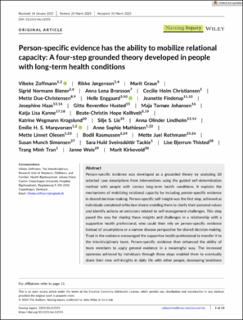Person-specific evidence has the ability to mobilize relational capacity: A four-step grounded theory developed in people with long-term health conditions
Zoffmann, Vibeke; Jørgensen, Rikke; Graue, Marit; Biener, Sigrid Normann; Brorsson, Anna Lena; Christiansen, Cecilie Holm; Due-Christensen, Mette; Enggaard, Helle; Finderup, Jeanette; Haas, Josephine; Husted, Gitte Reventlov; Johansen, Maja Tornøe; Kanne, Katja Lisa; Kolltveit, Beate-Christin Hope; Krogslund, Katrine Wegmann; Lie, Silje Stangeland; Lindholm, Anna Olinder; Marqvorsen, Emilie H. S.; Mathiesen, Anne Sophie; Olesen, Mette Linnet; Rasmussen, Bodil; Rothmann, Mette Juel; Simonsen, Susan Munch; Tackie, Sara Huld Sveinsdóttir; Thisted, Lise Bjerrum; Tran, Trang Minh; Weis, Janne; Kirkevold, Marit
Peer reviewed, Journal article
Published version
Permanent lenke
https://hdl.handle.net/11250/3092904Utgivelsesdato
2023Metadata
Vis full innførselSamlinger
- Import fra CRIStin [3604]
- Institutt for helse- og omsorgsvitskap [2776]
Sammendrag
Person-specific evidence was developed as a grounded theory by analyzing 20 selected case descriptions from interventions using the guided self-determination method with people with various long-term health conditions. It explains the mechanisms of mobilizing relational capacity by including person-specific evidence in shared decision-making. Person-specific self-insight was the first step, achieved as individuals completed reflection sheets enabling them to clarify their personal values and identify actions or omissions related to self-management challenges. This step paved the way for sharing these insights and challenges in a relationship with a supportive health professional, who could then rely on person-specific evidence instead of assumptions or a narrow disease perspective for shared decision-making. Trust in the evidence encouraged the supportive health professional to transfer it to the interdisciplinary team. Person-specific evidence then enhanced the ability of team members to apply general evidence in a meaningful way. The increased openness achieved by individuals through these steps enabled them to eventually share their new self-insights in daily life with other people, decreasing loneliness they experienced in self-management. Relational capacity, the core of the theory, is mobilized in both people with long-term health conditions and healthcare professionals. Further research on person-specific evidence and relational capacity in healthcare is recommended.

